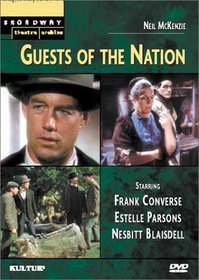| Actors: Frank Converse, Richard Cottrell, Charlie Stavola, Nesbitt Blaisdell, Nicholas Kepros Director: John J. Desmond Creators: John J. Godfrey, Jac Venza, Patricia Zohn, Phylis Geller, Frank O'Connor, Kenneth Cavander, Neil McKenzie Genres: Drama, Television, Musicals & Performing Arts, Military & War Sub-Genres: Drama, Television, Broadway Theatre Archive, Military & War Studio: Kultur Video Format: DVD - Color DVD Release Date: 05/13/2003 Original Release Date: 02/09/1981 Theatrical Release Date: 02/09/1981 Release Year: 2003 Run Time: 1hr 0min Screens: Color Number of Discs: 1 SwapaDVD Credits: 1 Total Copies: 0 Members Wishing: 2 MPAA Rating: NR (Not Rated) Languages: English |
Search - Guests of the Nation (Broadway Theatre Archive) on DVD
  | Guests of the Nation Broadway Theatre Archive Actors: Frank Converse, Richard Cottrell, Charlie Stavola, Nesbitt Blaisdell, Nicholas Kepros Director: John J. Desmond Genres: Drama, Television, Musicals & Performing Arts, Military & War NR 2003 1hr 0min This drama tells the story of Irish insurgents and the captured British soldiers whom they are assigned to guard. While confined to a remote farmhouse the foursome enjoy card playing, jig dancing, and a great deal of amiab... more » |
Larger Image |
Movie DetailsSimilar Movies
|
Movie Reviews"I never could make out what duty was, meself." Mary Whipple | New England | 12/09/2004 (5 out of 5 stars) "Frank O'Connor's famous short story becomes a stage play by Neil McKenzie in this Broadway Theatre Archives production, directed by John Desmond. Set in Ireland in 1921, the waning days of the fight for Irish independence, the play, like the short story, emphasizes the futility of war as two Irishmen capture two British soldiers while the British soldiers are bird-watching. Assigned to guard them in an Irish cottage for three weeks, the Irish soon discover that the British, like them, are country people who have been doing what they are expected to do by those in charge of their "side." None of them are really committed to the bloodshed which has marked this horrific war for independence.
To help the time pass inside Kate O'Connell's thatched cottage, they play cards together, practice step-dancing, share cigarettes, become friends on the most basic level, and even argue about the fine points of religion. The Irish think their prisoners are "decent chaps....to keep a guard on them is beyond sense," while the British acknowledge that "it's hard to remember what side you're on....I ain't even thinking of being set free no more." When a sixteen-year-old English soldier is killed in the western part of Ireland, the Irish soldiers must decide whether their emotional kinship with these simple, British "good lads" is stronger than their political kinship with the Irish army. The almost slapstick high humor of the beginning becomes agonized decision-making in the course of the play. Frank Converse, as Barney, and Richard Cottrell, as Noble, the Irish guards, effectively convey the difficulties of wielding power over men very much like themselves. Charlie Stavola, as the irrepressible, harmonica-playing Hawkins, and Nesbitt Blaisdell as Belcher, the English birdwatcher, are so ingenuous that their efforts to be friends, rather than enemies, are completely believable. Estelle Parsons, as Kate O'Connell, offers common sense advice, gradually changing from being a crotchety scold to a woman blossoming under their attention. The music by Elizabeth Swados, mostly flute, fiddle, and bodhran drums, suits the setting, and the outdoor scenes in the Irish countryside are beautifully filmed. A play that goes straight to the heart, Guests of the Nation, shows two sets of "lads" trying to understand their "duty" when it is "hard to remember what side you're on." Mary Whipple " |




